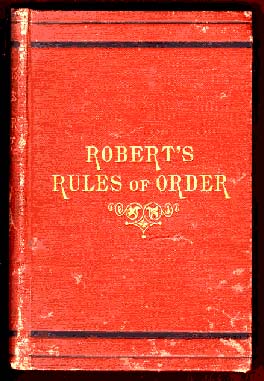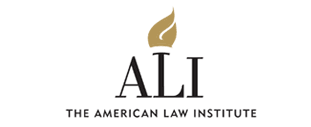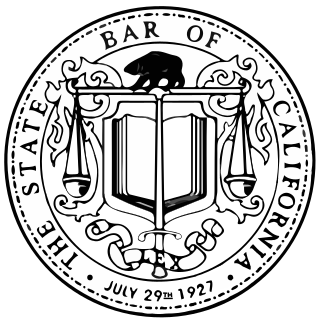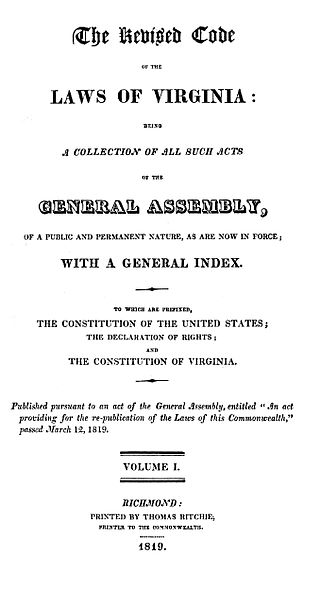Related Research Articles

The United States Code is the official codification of the general and permanent federal statutes of the United States. It contains 53 titles, which are organized into numbered sections.

Robert's Rules of Order, often simply referred to as Robert's Rules, is a manual of parliamentary procedure by U.S. Army officer Henry Martyn Robert. "The object of Rules of Order is to assist an assembly to accomplish the work for which it was designed [...] Where there is no law [...] there is the least of real liberty." The term Robert's Rules of Order is also used more generically to refer to any of the more recent editions, by various editors and authors, based on any of Robert's original editions, and the term is used more generically in the United States to refer to parliamentary procedure. It was written primarily to help guide voluntary associations in their operations of governance.

Parliamentary procedures are the accepted rules, ethics, and customs governing meetings of an assembly or organization. Their object is to allow orderly deliberation upon questions of interest to the organization and thus to arrive at the sense or the will of the majority of the assembly upon these questions. Self-governing organizations follow parliamentary procedure to debate and reach group decisions, usually by vote, with the least possible friction.

The Uniform Commercial Code (UCC), first published in 1952, is one of a number of uniform acts that have been established as law with the goal of harmonizing the laws of sales and other commercial transactions across the United States through UCC adoption by all 50 states, the District of Columbia, and the Territories of the United States.

The American Law Institute (ALI) is a research and advocacy group of judges, lawyers, and legal scholars established in 1923 to promote the clarification and simplification of United States common law and its adaptation to changing social needs. Members of ALI include law professors, practicing attorneys, judges and other professionals in the legal industry. ALI writes documents known as "treatises", which are summaries of generally state court common law. Many courts and legislatures look to ALI's treatises as authoritative reference material concerning many legal issues. However, some legal experts and the late Supreme Court Justice Antonin Scalia, along with some conservative commentators, have voiced concern about ALI rewriting the law.
A constitutional amendment is a modification of the constitution of a polity, organization or other type of entity. Amendments are often interwoven into the relevant sections of an existing constitution, directly altering the text. Conversely, they can be appended to the constitution as supplemental additions, thus changing the frame of government without altering the existing text of the document.
A by-law, also known in the United States as bylaws, is a set of rules or law established by an organization or community so as to regulate itself, as allowed or provided for by some higher authority. The higher authority, generally a legislature or some other government body, establishes the degree of control that the by-laws may exercise. By-laws may be established by entities such as a business corporation, a neighbourhood association, or depending on the jurisdiction, a municipality.

The Uniform Law Commission (ULC), also called the National Conference of Commissioners on Uniform State Laws, is a non-profit, American unincorporated association. Established in 1892, the ULC aims to provide U.S. states with well-researched and drafted model acts to bring clarity and stability to critical areas of statutory law across jurisdictions. The ULC promotes enactment of uniform acts in areas of state law where uniformity is desirable and practical. The ULC headquarters are in Chicago, Illinois.

The State Bar of California is an administrative division of the Supreme Court of California which licenses attorneys and regulates the practice of law in California. It is responsible for managing the admission of lawyers to the practice of law, investigating complaints of professional misconduct, prescribing appropriate discipline, accepting attorney-member fees, and financially distributing sums paid through attorney trust accounts to fund nonprofit legal entities. It is directly responsible to the Supreme Court of California. Its trustees are appointed by the Supreme Court, the California Legislature, and Governor of California. All attorney admissions are issued as recommendations of the State Bar, which are then routinely ratified by the Supreme Court. Attorney discipline is handled by the State Bar Office of Chief Trial Counsel, which acts as prosecutor before the State Bar Court of California. The State Bar has been cited for its corrupt practices during the 21st century, and is subject to reforms issued by its governing body, the California Supreme Court.
A parliamentary authority is a book of rules for conducting business in deliberative assemblies. Several different books have been used by legislative assemblies and by organizations' deliberative bodies.
A shareholder derivative suit is a lawsuit brought by a shareholder on behalf of a corporation against a third party. Often, the third party is an insider of the corporation, such as an executive officer or director. Shareholder derivative suits are unique because under traditional corporate law, management is responsible for bringing and defending the corporation against suit. Shareholder derivative suits permit a shareholder to initiate a suit when management has failed to do so. To enable a diversity of management approaches to risks and reinforce the most common forms of corporate rules with a high degree of permissible management power, many jurisdictions have implemented minimum thresholds and grounds to such suits.

The Code of Virginia is the statutory law of the U.S. state of Virginia and consists of the codified legislation of the Virginia General Assembly. The 1950 Code of Virginia is the revision currently in force. The previous official versions were the Codes of 1819, 1849, 1887, and 1919, though other compilations had been printed privately as early as 1733, and other editions have been issued that were not designated full revisions of the code.

In United States business law, a registered agent is a business or individual designated to receive service of process (SOP) when a business entity is a party in a legal action such as a lawsuit or summons. The registered agent's address may also be where the state sends the paperwork for the periodic renewal of the business entity's charter. The registered agent for a business entity may be an officer or employee of the company, or a third party, such as the organization's lawyer or a service company. Failure to properly maintain a registered agent can affect a company negatively.
The Model Business Corporation Act (MBCA) is a model act promulgated and periodically amended by the Corporate Laws Committee of the Business Law Section of the American Bar Association (Committee). The MBCA had been adopted by 36 states and other jurisdictions. The MBCA provides a modern body of statutory corporate law that is regularly updated by the Committee based on judicial decisions, recent legislative enactments and other legal and technological developments. It is a well-organized and clearly-written statute for business (stock) corporations that covers a number of areas, including formation, governance and director conduct and liability. The MBCA has been influential in shaping standards for United States corporate law.

The California Codes are 29 legal codes enacted by the California State Legislature, which, alongside uncodified acts, form the general statutory law of California. The official codes are maintained by the California Office of Legislative Counsel for the legislature. The Legislative Counsel also publishes the official text of the Codes publicly at leginfo.legislature.ca.gov.
The Uniform Securities Act (USA) is a model statute designed to guide each state in drafting its state securities law. It was created by the National Conference of Commissioners on Uniform State Laws (NCCUSL).
Civil procedure in the United States consists of rules that govern civil actions in the federal, state, and territorial court systems, and is distinct from the rules that govern criminal actions. Like much of American law, civil procedure is not reserved to the federal government in its Constitution. As a result, each state is free to operate its own system of civil procedure independent of her sister states and the federal court system.
Edict of government is a technical term associated with the United States Copyright Office's guidelines and practices that comprehensively includes laws, which advises that such submissions will neither be accepted nor processed for copyright registration. It is based on the principle of public policy that citizens must have unrestrained access to the laws that govern them. Similar provisions occur in most, but not all, systems of copyright law; the main exceptions are in those copyright laws which have developed from English law, under which the copyright in laws rests with the Crown or the government.
The Uniform Trust Code is a model law in the United States created by the Uniform Law Commission, which, although not binding, is influential in the states and used by many as a model law. As of October 2022, 36 states and jurisdictions have enacted a version of the Uniform Trust Code. As of October 2022, legislation has been proposed in New York to adopt the UTC.
The Illinois Compiled Statutes (ILCS) are the codified statutes of a general and permanent nature of Illinois. The compilation organizes the general Acts of Illinois into 67 chapters arranged within 9 major topic areas. The ILCS took effect in 1993, replacing the previous numbering scheme generally known as the Illinois Revised Statutes, the latest of which had been adopted in 1874 but appended by private publishers since.
References
- ↑ Nonprofit Corporations: Revision of Revised Model Nonprofit Corporation Act
- ↑ Malamut, Michael. "Issues of Concern to Parliamentarians Raised by the 2008 Revision of the Model Nonprofit Corporation Act" (PDF). National Association of Parliamentarians. Retrieved March 9, 2011.
- ↑ Model Nonprofit Corporation Act: Official Text with Official Comments and Statutory Cross-References Adopted August 2008. ABA Section of Business Law. 2009. pp. xix. ISBN 9781604420593.
- ↑ Model Nonprofit Corporation Act: Official Text with Official Comments and Statutory Cross-references. American Bar Association, Business Law Section. 2022. pp. xvii. ISBN 9781639051021.